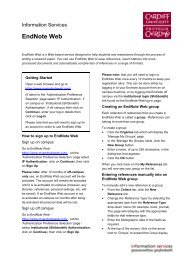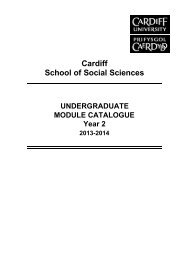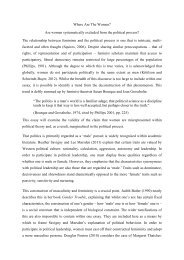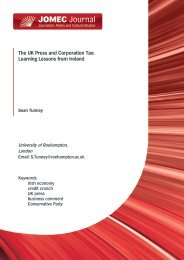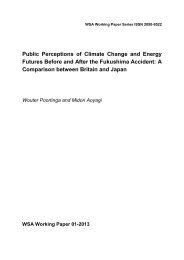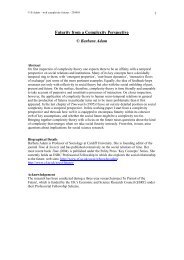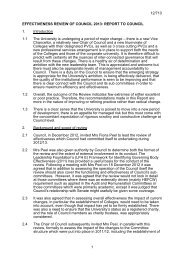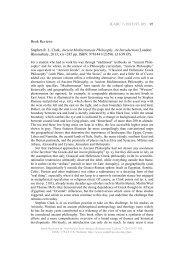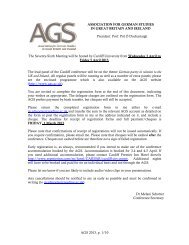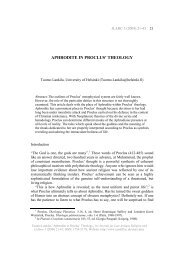Tina Askanius - Cardiff University
Tina Askanius - Cardiff University
Tina Askanius - Cardiff University
You also want an ePaper? Increase the reach of your titles
YUMPU automatically turns print PDFs into web optimized ePapers that Google loves.
of unregulated markets and economic<br />
growth. 2<br />
In the following, I suggest that the motley<br />
body of political video and filmmaking<br />
concerned with the social, political and<br />
environmental consequences of neoliberalism,<br />
understood as both a regulatory<br />
force, political rationale and mode of<br />
governmentality, inscribes itself into this<br />
trajectory of intellectual and political<br />
movements that draw heavily on visual<br />
media in their struggle for voice and<br />
representation. The new generation of<br />
online video activists are thus (more or<br />
less knowingly) furthering a timehonoured<br />
tradition with roots in this<br />
prismatic array of experimental and<br />
alternative media movements (Gregory et<br />
al. 2005). While television, historically, has<br />
been considered the most challenging<br />
medium to reconstruct in an alternative<br />
mode because of the high costs of<br />
production and distribution (Hands<br />
2009), the development of internetenabled<br />
video in conjunction with lowcost,<br />
or even free editing tools have<br />
made video- production, remixing and<br />
commentary literally for everyone. This<br />
‘democratisation’ 3 requires us to look<br />
closer at the diverse nature of politically<br />
motivated video currently in circulation<br />
and at how these digital genres are<br />
reminiscent of their analogue precursors<br />
2<br />
For an extensive analysis of the lines of<br />
continuity between the alter-globalisation<br />
protests of the 1990ies/early 2000s and the<br />
recent wave of political mobilisations in the<br />
Occupy movement and beyond, see Fominaya<br />
and Cox (2013).<br />
3 Democratisation is put in brackets to indicate<br />
the ambiguity of such a claim. The inherent<br />
promise of YouTube as a democratic platform<br />
from which everyone can raise their voice and<br />
broadcast themselves is obviously undercut by<br />
the realities of commercial interests and<br />
censorship that saturate the social media<br />
industry today.<br />
www.cf.ac.uk/JOMECjournal<br />
but may also bring essentially new<br />
qualities into the mix.<br />
‘New’ forms of video activism rooted in<br />
‘old’ political struggles<br />
As a first analytical effort, I start by<br />
offering a typology of the prismatic body<br />
of different videos mobilising for,<br />
reporting from, and reflecting upon the<br />
three political mobilisations across<br />
Europe and anti-capitalist struggles more<br />
generally. These include the mobilisation<br />
video, the witness video, the documentation<br />
video, the archived radical video<br />
remediating historical work and finally,<br />
the political mash-up video. By detailing<br />
five broad-brushed types of radical<br />
online video, I provide a framework to<br />
contextualise the analytical efforts of the<br />
second section, in which I turn to a more<br />
detailed analysis of the political mash-up<br />
as a particularly prevalent category of<br />
video recruited for Left wing thinking and<br />
action today. Needless to say, this is no<br />
exhaustive categorisation. Not only would<br />
such an undertaking be relatively<br />
useless, it is also not possible to make<br />
any empirical generalisations about<br />
universal patterns and categories on the<br />
basis of the empirical material. These are<br />
hybrid genres within a chaotic and<br />
staggeringly abundant sea of online<br />
videos. Hence, in the proposed typology, I<br />
engage with some, but not all, of the<br />
different forms of politically committed<br />
video one can encounter on YouTube<br />
today.<br />
Mobilisation videos<br />
The term mobilisation video is used, by<br />
practitioners and activists, to refer to the<br />
short videos disseminated prior to a prescheduled<br />
demonstration or direct<br />
action event (for a few examples of this<br />
5 <br />
@JOMECjournal



